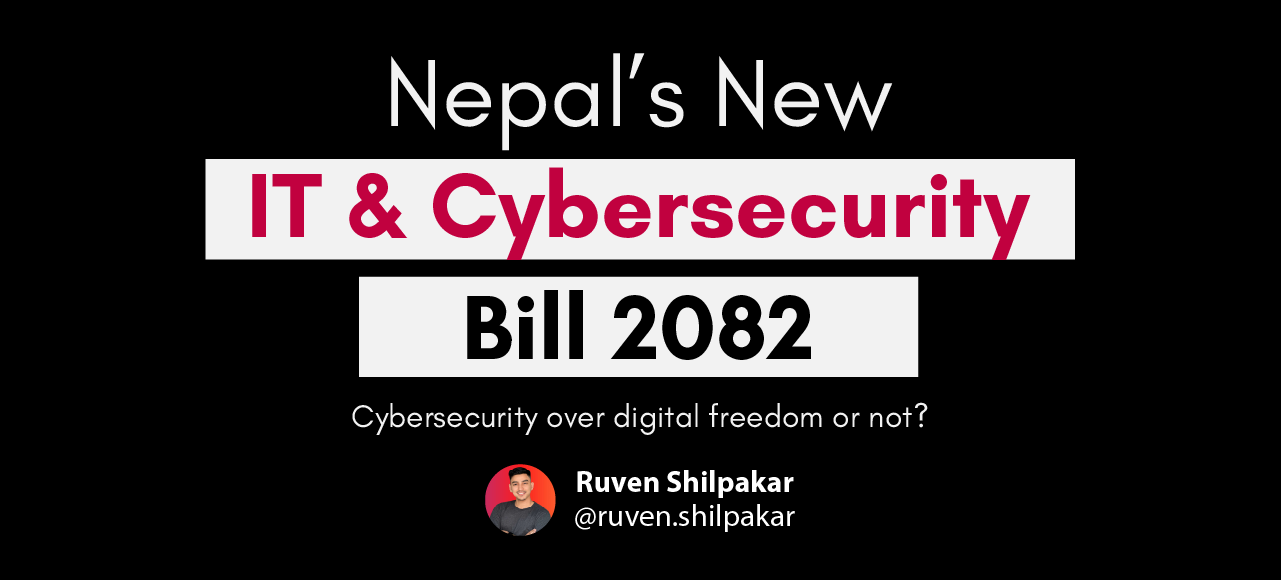Table of Contents
Nepal’s proposed IT Bill / Cybersecurity Bill, 2082 (2025) is currently under review in Parliament. If passed, this law will have significant implications for how the country manages digital data, regulates online services, and safeguards cyber infrastructure.
This article breaks down what the bill includes, what it could mean for digital rights, data privacy, businesses, and where concerns are rising.
What Is the new Nepal IT Bill 2082 / Cybersecurity Bill 2082?
The bill is designed to regulate Nepal’s digital space by:
- Standardizing the management of digital records, electronic signatures, and cybersecurity systems
- Introducing legal recognition for digital documents and digital signatures
- Establishing a formal framework for data protection, privacy management, and cybercrime investigation
- Setting up licensing requirements for data centers, cloud services, and domain operators
- Creating a central Cyber Security Center to monitor cyber incidents and enforce regulations
The government claims the bill aims to promote IT growth, strengthen cybersecurity, and protect users in Nepal’s rapidly digitizing economy.
Key Provisions and Features
- Legal Recognition of Digital Signatures and Records
Digital signatures will have the same legal status as handwritten signatures if specific verification procedures are followed. - Mandatory Licensing for Digital Service Providers
Data centers, cloud service providers, and companies operating domain name systems must register and obtain licenses from the government. - Establishment of a National Cyber Security Center
A dedicated authority will oversee cybersecurity monitoring, incident response, and system audits. - Personal Data Protection
The bill mandates secure handling of personal and sensitive information, including biometric, financial, and identity data. - Domain Name Regulation
Domain names within Nepal’s .np namespace will be centrally regulated, with restrictions on offensive or misleading names. - Government Authority to Access Data Systems
For cybercrime investigations, designated officers can access private data systems, servers, and networks. - Penalties and Fines
Severe fines are proposed for unauthorized access, operating without a license, or data mishandling, reaching up to several hundred thousand rupees. - Annual Security Audits
Licensed entities like data centers and cloud service providers must submit annual security audit reports.
Potential Issues and Public Concerns
While the bill addresses the growing need for cybersecurity and data regulation, several provisions have raised important questions:
- Privacy Risks: Granting government agencies broad rights to access private data systems without clearly defined oversight mechanisms could threaten personal privacy.
- Freedom of Expression: Ambiguous definitions of prohibited online content could allow for censorship or limit public discourse.
- Increased Compliance Costs: Small tech startups and SMEs may struggle to meet the administrative, financial, and technical requirements.
- Impact on Cloud Services: Though data localization isn’t explicitly mandated, licensing requirements may effectively pressure companies to host data within Nepal, increasing operational costs.
- Limited Public Consultation: Experts and digital rights advocates have called for more transparent, inclusive discussions on the bill’s provisions.
What You Should Know
- The bill has not been passed yet — it’s currently being debated in Parliament.
- It affects anyone managing or handling personal, financial, or digital data in Nepal, whether individuals, businesses, or public institutions.
- If passed, new rules for cybersecurity, digital signatures, data privacy, and domain registration would become legally binding.
- The bill establishes formal processes for cyber incident reporting and security audits.
- International cloud service providers operating in Nepal could face stricter operational conditions.
What to Avoid
- Ignoring the bill’s implications if you run a business or manage digital platforms involving customer or employee data.
- Operating digital services or data systems without understanding the proposed licensing and compliance obligations.
- Overlooking the potential risks to personal digital rights, including privacy, freedom of expression, and online access.
Common Questions and Clarifications
Does this affect individual social media users?
Indirectly, yes. Authorities would gain expanded powers to monitor online content and user activities under broad definitions of cyber incidents and offensive material.
Do personal websites need a license?
No, but businesses running data centers, cloud services, or domain registries would require formal licensing.
Can government agencies access personal data without court orders?
The bill provides authorities with wide access rights, though it lacks strong oversight provisions, raising concerns about potential misuse.
Will international platforms like Google or AWS be affected?
They may face operational challenges or licensing obligations if providing cloud or hosting services for Nepali clients.
Final Thought
Nepal’s IT & Cybersecurity Bill represents a crucial step in securing digital infrastructure and protecting personal data. However, to truly serve its purpose, it must carefully balance national security and regulation with citizens’ rights to privacy, freedom of expression, and online innovation. Transparent public discussion and expert consultation are essential before this bill becomes law.
What are your thoughts, do you believe this bill prioritizes cybersecurity over digital freedom, or strikes a fair balance? I’d love to hear your perspective in the comments.
